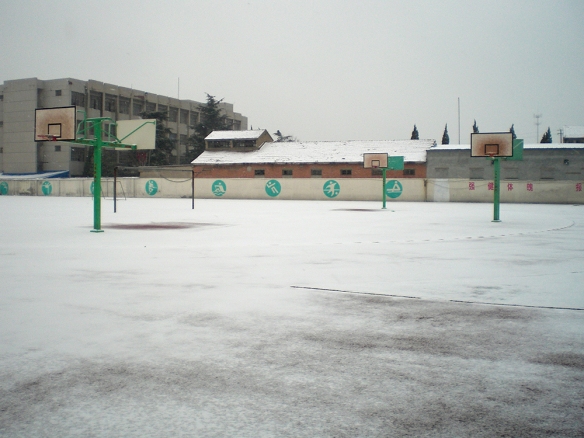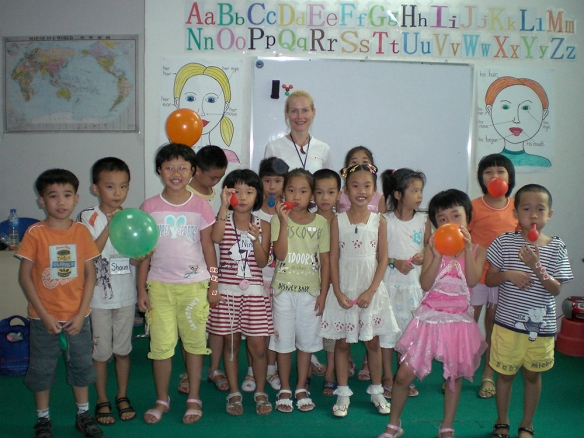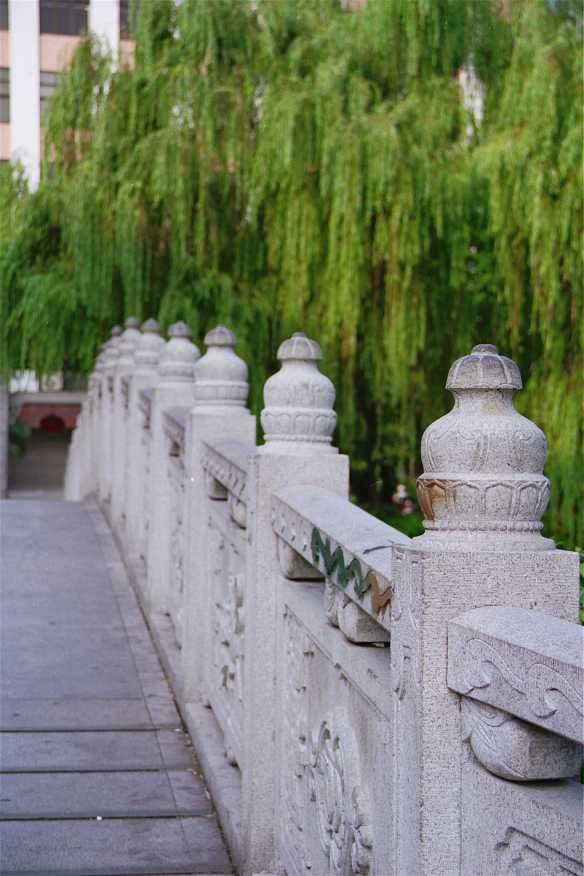Every morning I wake to the smell of burning plastic and rubber. My nose runs like a river undammed. At 6.30 am Susan, another Western teacher, and I walk laps around the school running track. Today the pollution-fog is so thick that I can look directly at the burnished amber disc that is the sun. Chanting echoes down through the fog. The students are already in class doing their morning reading.
***
Amber, one of the Chinese-English teachers, invites me to watch her teach an English class. Sixty desks are crammed into her classroom, each one stacked high with textbooks. The students sit on small backless stools and when I enter they rush to find one for me. I sit squashed up against the back wall, barely fitting between the rows of desks. The room is completely silent as Amber teaches. The students choral drill when prompted but out of sixty students only six stand to speak during the hour-long lesson.
***
My students constantly ask about school life in Australia. I distribute a letter from Rose, a student in Bunbury, who, at my request, has written to them about her school.
‘What do you think about school life in Australia?’
‘Australian students are so lucky.’
‘School in Australia is like a holiday.’
My attempt at cultural exchange has gone awry. Glum faces replace smiling ones. ‘Would you like to write a letter to Rose, telling her about schooling in China?’
‘Yes!’ they chorus and the room becomes silent except for the sound of pens scratching across paper.
Dear Rose,
I go to high school in Ben’niu, Jiangsu Province, eastern China. My school has approximately 2500 students aged 16-19 years old. We go to school nearly seven days a week, from 6.35 am to 9.45 pm. We have about half an hour for lunchtime. We also have a canteen but it isn’t very popular. We often eat rice, meat and vegetables for lunch. We have a lot of homework to do every day. We spend 3-4 hours on it.
Best wishes
Cherry
Dear Rose,
I have loved your school life and I want to go to your school to study. We have eight lessons in one day and three self-classes. We are very tired when school is over! We have two home-days once a month. On the Sunday afternoon we have two hours free time. We can go out of school and go shopping or playing. But at 4.30 pm we need to go back to our class and do homework or reading.
Best wishes
Snow
Dear Rose,
We have much homework and it’s very difficult for some students but we are very lucky because we can ask our teachers for help. They are patient and helpful. Most of the students live in our school and we go home once a month, so we often feel helpless and unhappy. In China, school life isn’t the same as yours in Australia, but people can’t live without knowledge!
Best wishes
Siso
***
We have a pet hedgehog, bought on impulse at the market. I’ve named him Russell because he constantly tips over the wastepaper bin and rustles around in it, kicking out every last scrap, looking for food. He also likes to bite Ash on the big toe.
***
One day, over lunch, I ask Mr Auden, the principal of Ben’niu Junior High School, why the students are pushed to work so hard.
‘Well, of the junior high students, only the top forty per cent can go on to senior high school. The rest will go home. For them, education is over. Only thirty per cent of senior students can go to university, and not all of them will be accepted. The other seventy per cent, they go home, get a job, maybe go to a college. But real education, and a chance at a better life, is over for them,’ he explains.
‘Why are so few university positions offered?’ asks Ash.
‘Because China has too many people. Even at thirty per cent there are too many students and not enough spaces at university. So the students must work very hard if they want a better life.’
‘So, what scores should the students get to proceed to the next level?’ I ask.
‘They should score ninety per cent or above. Actually ninety-five per cent is preferred. This will guarantee a student’s position at the next level of schooling.’
***
I awake to Ben’niu transformed. It snowed last night and our ugly town is quiet, white, beautiful. The snow falls and falls. For days it falls. My students race out of class onto the oval, squealing and shouting. It’s the first time any of them have seen snow. Still the snow falls. ‘China experiences coldest winter in two decades’ announces the China Daily. Some provinces are experiencing their worst winter in fifty years. Houses have been destroyed, crops frozen, power lines are down in many areas, transport and rail lines have ground to a halt and millions of migrant workers are stranded, unable to return home for the holidays. Silence descends over our industrial town as roads are closed. Determined taxis skid and slide down the main street. Bored hairdressers build giant snow-mice, complete with whiskers; it’s Chinese New Year, Year of the Rat.
***
Emma and Simeon invite us to spend the Chinese New Year holidays with them, in Beijing. The train lines are declared open just two days before our planned departure. The city pulses with energy, as much from the New Year’s celebrations as preparations for the 2008 Olympics, in six months’ time. There’s so much to see and do: the Great Wall, the Summer Palace, the Winter Palace, Mao’s Mausoleum, Tiananmen Square, markets, fake designer label stores, and English bookstores.






